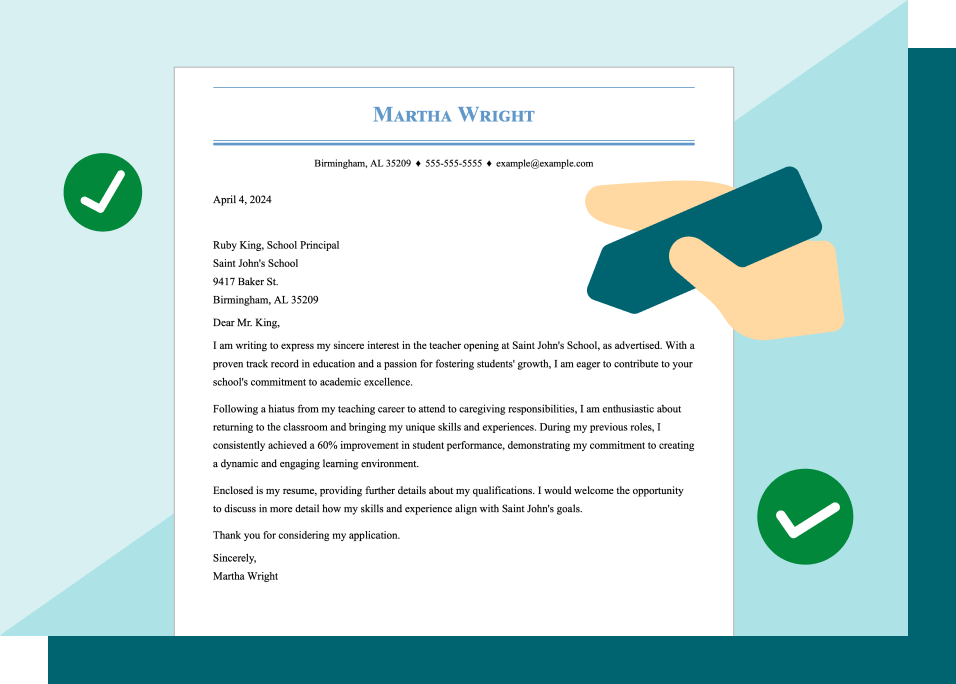15 Short Cover Letter Examples (+Writing Guide)
Boost your job application with our short cover letter examples and expert writing tips! Pick any of our short cover letter samples to convey all your qualifications while keeping the letter brief.
Hired By:*


Why write a short cover letter?
In the fast-paced world of job hunting, brevity is often the key to success. That’s where a short cover letter comes in, packing a powerful punch in a tiny package. But why should you consider ditching the lengthy prose and embracing the concise approach? Let’s explore why:
- Time-saving magic: Recruiters are bombarded with applications, and a long cover letter can quickly get lost in the shuffle. However, a short and simple cover letter stands out as a breath of fresh air, instantly grabbing their attention and saving them precious time.
- Laser-focused impact: With limited space, you must prioritize your skills and experiences, highlighting only the most relevant ones for the specific role. This laser focus ensures your message is clear and impactful, showcasing your perfect fit for the job.
- A gateway to more interviews: A short cover letter increases your chances of landing that coveted interview by efficiently saving recruiters time and showcasing your skills. It’s a win-win situation for both you and the hiring manager.
15 short cover letter examples
Struggling to fit big achievements in a short cover letter? In just one or two brief paragraphs, these short cover letter samples highlight your unique strengths and enthusiasm for the job.
Keep reading to find the short cover letter sample that matches your job and career scenario, plus tips on capturing the recruiter’s attention.
Short cover letter example for entry-level job
Short cover letter example for mid-career job
Short cover letter example for executive role
Short cover letter example for IT job
Short cover letter example for creative job
Short cover letter example for health care job
Short cover letter example for corporate job
Short cover letter example for candidate with no experience
Short cover letter example for students
Short cover letter example for senior applicants
Short cover letter example for internship
Short cover letter example for career change
Short cover letter example for reentering workforce
Short cover letter example for promotion
Short cover letter example for company without job openings
You can find dozens of cover letters — short, long and everything in between — in our cover letter examples library that you can easily customize. Try our top-rated Cover Letter Generator for quicker writing and get a fully personalized letter in minutes!
How to write short cover letters
Writing a cover letter is simple when you divide it into three essential parts: the opening, body paragraph and closing. The following quick tips will teach you how to write a cover letter that condenses crucial information into one or two brief paragraphs.
1
Start with an opening that grabs recruiters’ attention.
You need the first paragraph of your cover letter to spotlight your skills and leave the recruiter wanting to read more. Here are some ideas to get your creative juices flowing:
- Highlight a quantifiable achievement: Showcase your impact with numbers. Did you increase sales by 20%? Streamline a process by 50%? Those are the achievements that will make your short cover letter an impactful one.
- Share a relevant anecdote: Connect with recruiters more personally by sharing a powerful career highlight.
- Ask a thought-provoking question: Engage recruiters by inviting them into your thought process and share questions and ideas that demonstrate you understand the company’s mission.
2
Showcase only your most relevant qualifications in the body of the letter.
In the body of your letter, focus on the qualifications that convey you’re the perfect fit for the role. Don’t try to cram everything in — choose two to three essential skills or experiences that directly align with the job description.
Here’s the magic formula:
Skill + Specific Example + Quantifiable Impact = Hiring Manager Magic
For example, instead of stating, “I’m a great communicator,” show it: “Successfully implemented a new communication strategy that boosted employee engagement by 15%.” See the difference? Quantifiable accomplishments add sparkle to your claims.
3
Finalize with a memorable call to action.
After you’ve hooked them and highlighted your brilliance, finish strong. Let the recruiter know you’re eager to continue the conversation in the cover letter’s closing paragraph.
Here are some ways to seal the deal:
- Express your enthusiasm: “I’m incredibly excited about the opportunity to contribute my skills …”
- Suggest next steps: “I’d love to discuss my qualifications further …”
- Offer something unique: “I’ve attached a one-page case study demonstrating my expertise in …”
Finally, end with an appropriate cover letter sign-off and your name. Voilá! You created a short yet impactful cover letter.
PRO TIP
Sending your cover letter via email? Include a catchy subject line.
When emailing your cover letter, its subject line should include a brief headline along with your name and desired role will get the job done.
For example:
Subject Line — SEO Expert with 7+ Years Experience – Gabe Horner, Job ID: 5643
This subject line shares a key skill and impressive years of experience that will grab the hiring manager’s attention.
Although optional, depending on the information in the job advertisement, you may also include the job’s reference number to make the recruiter’s job easier.
Do's and don'ts to writing short cover letters
Now that you’ve mastered all the main elements of a short cover letter let’s polish it to avoid common cover letter mistakes. Here’s a quick rundown of short cover letter do’s and don’ts:
Do:
Keep it concise: A short cover letter should pack all the crucial skills, experiences and qualifications into one to two paragraphs max.
Leverage your network: Got a connection at the company? Name-drop them in the first sentence! Mentioning a connection like this is one of the surest ways to get a recruiter’s attention; after all, employee referrals are five times more likely to be hired.
Speak plain English: Ditch the jargon for simple concepts and phrases. If you find yourself at a loss for words, check out the best action verbs to put on your cover letter and resume.
Show, don’t tell: Instead of boasting about your skills, link to concrete examples of your work. A portfolio, a blog post, a stellar presentation — let your work speak for itself.
Bullet points are your best friend: They break up text, add visual interest, and make your information easily digestible.
Don’t:
Overload on buzzwords: Words like “synergy” and “paradigm shift” are recruiter red flags. Stick to genuine descriptions of your skills and accomplishments, and include keywords from the job description.
Focus on your career journeys: Focus on achievements and qualifications relevant to the job; don’t just describe every role you’ve had. Your journey from paperboy to astronaut is better suited for a novel than a cover letter.
Repeat what’s in your resume: Don’t just restate your resume’s content. Use the letter to feature more relevant accomplishments or provide context to your career highlights.
Remember, your cover letter is an extension of you, not a dry copy of your resume. Inject your personality, showcase your passion, and keep it concise and impactful.
PRO TIP
Pair a short cover letter with an impactful resume that shares all your most job-relevant accomplishments. Create a resume with the right keywords, skills and education with the help of our Resume Builder.
Key takeaways
Here are the key takeaways from the article:
- Short cover letters save recruiters time and stand out from lengthy applications.
- A short and simple cover letter pushes you to prioritize your skills and showcase the most relevant ones.
- Short letters demonstrate efficiency and communication skills, making you appear proactive.
- A brief yet impactful cover letter injects a human touch and increases your chances of landing an interview.
- Highly competitive positions merit a longer cover letter with more detailed experience and achievements.
- For unconventional career paths, a full-page cover letter with additional context will benefit you more.
- A longer cover letter showcasing your artistic side or excellent writing skills is a better option in creative fields.
- Overall, a short cover letter should still include an attention-grabbing opening paragraph, a direct body paragraph highlighting your top qualifications (ideally in bullet points), and a closing call to action to seal the deal.
With these tips and short cover letter examples, you’ll be well on your way to acing your next job application!
FAQ
What do I include in a short cover letter?
Your short cover letter must include all the standard sections of any cover letter for a job. Always have the following:
- A letterhead and header with your contact information followed by the date, the recipient’s name and address.
- A formal greeting addressing the recipient, like “Dear Dr. Ramos” or “Dear Hiring Manager.”
- An impactful opening paragraph that captures the reader’s attention and states your name and purpose.
- A direct body paragraph(s) showcasing what makes you stand out for a particular role.
- A closing paragraph inviting the reader to a future conversation about your candidacy for the position.
- Formal sign-offs like “Sincerely,” “Kind regards,” and your name or signature.
How do I format a short cover letter?
Keep it simple and professional:
Length: Aim for one to two paragraphs, max.
Formatting: Use a clear font, single spacing, and one-inch margins for easy readability. Always stick to the business letter formatting, including the date, recipient’s name and address, and a formal greeting. You can reference how to write this cover letter header on our cover letter formats page.
Tone: Be professional, but inject your personality with engaging language.
Proofread: Double-check for typos and grammatical errors to make you appear sharp and detail-oriented.
Bonus tip: Consider bullet points to break up text and emphasize key points.
Will recruiters turn down a short cover letter?
Not at all. Recruiters appreciate when applicants are considerate of their busy schedules, and a brief and direct cover letter is a godsend amidst a sea of lengthy letters filled with irrelevant details. As long as your cover letter has all the necessary information to compel a recruiter for an interview, your letter can be as short as you want.
How short should my cover letter be?
Your cover letter can be one paragraph long as long as you highlight the skills and qualifications that set you apart. Our short cover letter samples range between 900 and 1400 characters reference.
When shouldn’t you write a short cover letter?
While short cover letters have undeniable benefits, there are situations where a more traditional approach might be more suitable. Here are a few scenarios where you might want to reconsider submitting a short cover letter:
- Highly competitive positions: For executive roles or highly sought-after positions, a longer cover letter might be necessary to showcase your extensive experience and achievements fully.
- Unconventional career paths: If your career path is unique or requires a specific explanation, a longer letter can help bridge the gap and provide the necessary context to your application.
- Creative fields: In industries like design, writing, or marketing, your portfolio might be the main focus. However, a brief cover letter can still be valuable to introduce yourself and connect your work to the specific role.
How We Reviewed This Article
Over the past 15 years, we’ve helped more than 10 million job seekers build stronger cover letters, discover their career paths, interview confidently, and boost their chances of finding the right job faster. Review our Editorial Policy to learn more about our process.






